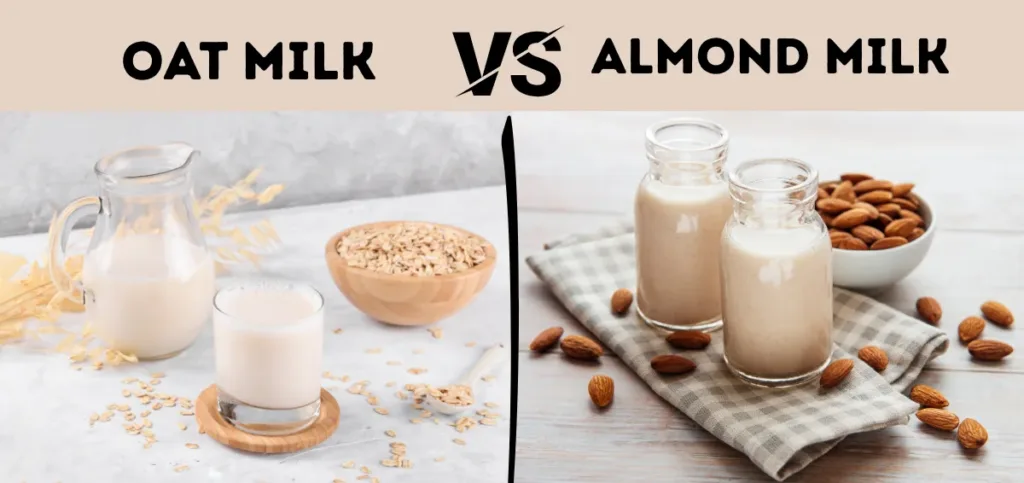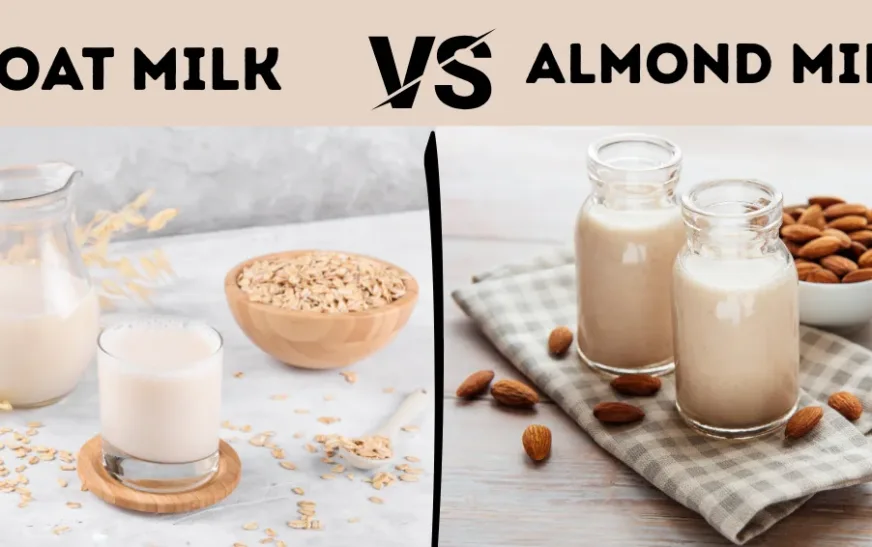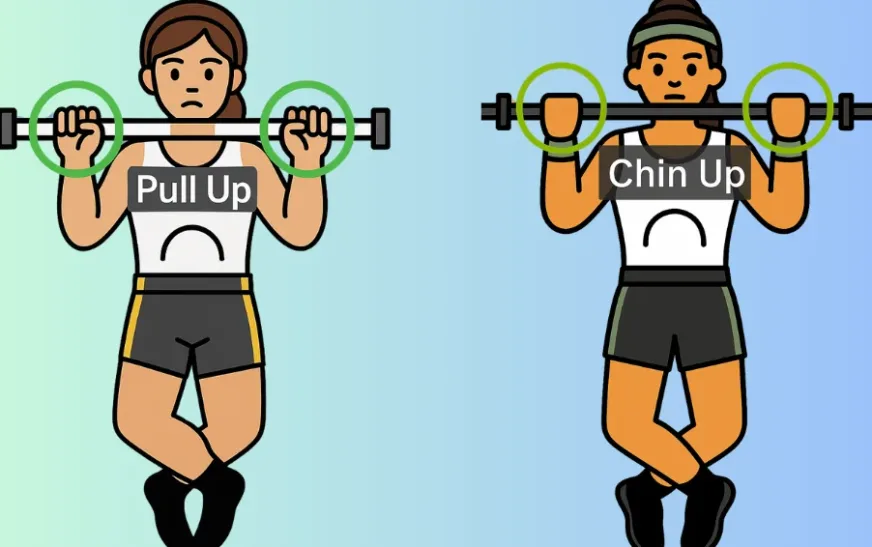
With a larger number of people going for plant-based lifestyles, dairy-free alternatives, like oat milk and almond milk, are becoming popular choices. If you follow a vegan diet or have lactose and dairy sensitivities, then oat and almond milk are excellent options for you. These are not only naturally lactose-free and dairy-free but also offer unique health benefits. Both oat milk and almond milk, when unsweetened, are low in calories and packed with essential vitamins and minerals.
Nutritional Comparison: Oat Milk vs. Almond Milk
| Oat Milk vs. Almond Milk Nutrition Facts | ||
| Oat Milk (8 ounces) | Almond Milk (8 ounces) | |
| Calories | 79 | 29 |
| Carbohydrates | 14 grams (g) | 1 g |
| Protein | 4 g | 1 g |
| Fat | 1.5 g | 2.5 g |
| Fiber | 1.9 g | 1 g |
| Sodium | 120 milligrams (mg) (5.2% DV) | 189 mg (8.2% DV) |
| Calcium | 19.2 mg (1.9% DV) | 451 mg (45% DV) |
| Vitamin D | 0 international units (IU) (0% DV) | 101 IU (16.8% DV) |
| Iron | 0.72 mg (9% DV) | 1 mg (12.5% DV) |
| Potassium | 170 mg (5% DV) | 93.6 mg (2.8% DV) |
Health Benefits of Oat Milk

Oats are a popular healthy food choice due to their antioxidant, antifungal, and anti-inflammatory properties. These benefits get transferred to oat milk, which is prepared by blending oats with water.
Read Also: Cold Brew vs. Iced Coffee
The major benefits of having oat milk are as follows:
1. Oat milk contains beta-glucan, a type of dietary fibre known for its ability to help lower cholesterol levels. This reduces the risk of heart-related diseases. Beta-glucan also helps regulate your blood sugar levels. It also enables healthy bowel movements and allows you to feel fuller for longer.
2. Oat milk is an excellent source of many minerals and vitamins, including vitamin D, calcium, and phosphorus—these help in maintaining healthy bones.
3. Most variations of oat milk are spiked with vitamin B2 and vitamin B12. These vitamins help repair and protect your skin and make your hair and nails grow stronger and shinier.
4. Oat milk includes no fatty acids or trans fats. This helps in keeping your cholesterol levels low.
5. Oat milk has higher protein levels than almond milk, cashew milk, coconut milk, and rice milk. Protein helps in building and repairing body tissues, including muscles, bones, and skin.
6. Since eating foods that contain beta-glucan leads to good gut health, oat milk is good for the gut.
Downsides of Oat Milk
1. Oat milk tends to contain higher levels of carbohydrates than other plant-based milk alternatives. This could be a concern for individuals with diabetes or those focused on managing their blood sugar levels.
2. Some oat milk products may include additional sugar. This increases their glycemic index. As a result, these products can quickly improve your blood sugar levels.
3. The production process of oat milk destroys many natural nutrients of oats. This may make it a less healthy choice for some people.
4. Oat protein is low in the essential amino acid lysine, which can impact digestion. Additionally, compounds like phytates and oxalates found in oat milk may reduce your body’s ability to absorb certain minerals.
Health Benefits of Almond Milk

Almond milk is a popular plant-based milk alternative. It’s typically made by soaking almonds in water, blending them, and straining the mixture. This dairy-free option provides several potential health benefits.
1. Almond milk is an excellent source of magnesium. Magnesium is vital for muscle function and blood sugar control. It also significantly aids in making bone, protein, and DNA.
2. Almond milk contains vitamin E. Vitamin E helps in building your immune system and blood vessels. A high intake of vitamin E may help reduce the risk of cognitive disorders like Alzheimer’s disease. As a powerful antioxidant, vitamin E also helps protect your cells from damage caused by harmful molecules known as free radicals.
3. Some brands of almond milk can be fortified with calcium. Calcium helps in building bone health and fighting diseases like osteoporosis.
4. Unsweetened almond milk contains fewer calories than dairy milk, about 50% to 80%. Being a low glycemic index food, unsweetened almond milk is not likely to cause an increase in your blood sugar levels.
5. Almond milk protects your heart. Eating almonds lowers bad cholesterol while increasing good cholesterol levels. This helps in protecting your heart.
6. Almond milk helps in weight loss and weight management. This becomes possible since it contains healthy fats, including monounsaturated fatty acids.
Downsides of Almond Milk
1. Almond milk could be a bit challenging to digest. This affects nutrient absorption as well.
2. Some brands of almond milk may lack essential nutrients naturally found in cow’s milk.
3. Many commercial variations of almond milk add sweeteners, thickeners, and preservatives. These negatively impact the nutritional value of the milk.
4. Some individuals may have an allergy to almonds and should avoid almond milk, as it can potentially cause an allergic reaction.
Read More: How to Make Almond Meal
Which One is Better for Weight Loss?
If you are considering weight loss, then almond milk is the clear winner. Among all the plant-based milk alternatives, almond milk has the lowest calories per serving. Almond milk is a fantastic option for everyday recipes like smoothies and cereal, offering greater support for weight loss compared to oat milk. Incorporating almond milk into various parts of your day, from your morning coffee and post-workout smoothie to your afternoon tea, can help you reduce your daily calorie intake. This will help you maintain your weight.
Which is healthier?
You can choose to have almond milk or oat milk based on your health goals and dietary choices. The following differences may also help you decide which one is healthier for you.
- Almond milk contains a slightly higher amount of fat and sodium than oat milk.
- Oat milk contains a higher number of calories, carbohydrates, and protein than almond milk.
- Almond milk contains more calcium than oat milk.
- Unsweetened almond milk contains a lower number of calories and healthy fats like monounsaturated fats.
- Oat milk has a higher fiber content than almond milk, making it beneficial for digestive health and supporting weight management.
- Oat milk is rich in vitamin D, calcium, and phosphorus, while almond milk provides a good amount of calcium, vitamin E, and phosphorus.
- Oat milk is a safer alternative for you if you are allergic to nuts.
Final Thoughts
Both oat milk and almond milk are excellent plant-based alternatives to dairy milk. Which one is a healthier choice for you depends on what’s more important for you. Almond milk is a good choice for weight loss. Additionally, it is a good source of vitamin E that protects your skin from UV damage and reduces wrinkles. So, almond milk helps in maintaining your beauty. If you are only looking at increasing your protein and fiber consumption, then oat milk is a better choice. It contains almost every nutrient. Depending on your health goals, make an informed choice.










